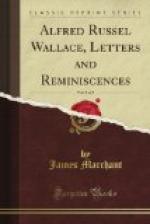As to your disagreement from me in the conclusions arrived at and strenuously advocated in the latter portions of my work, I am not surprised. I am afraid, now, that I have not expressed myself sufficiently clearly as to the fundamental phenomena which seem to me absolutely to necessitate a guiding mind and organising power. Hardly one of my critics (I think absolutely not one) has noticed the distinction I have tried and intended to draw between Evolution on the one hand, and the fundamental powers and properties of Life—growth, assimilation, reproduction, heredity, etc.—on the other. In Evolution I recognise the action of Natural Selection as universal and capable of explaining all the facts of the continuous development of species from species, “from amoeba to man.” But this, as Darwin, Weismann, Kerner, Lloyd-Morgan, and even Huxley have seen, has nothing whatever to do with the basic mysteries of life—growth, etc. etc. The chemists think they have done wonders when they have produced in their laboratories certain organic substances—always by the use of other organic products—which life builds up within each organism, and from the few simple elements available in air, earth, and water, innumerable structures—bone, horn, hair, skin, blood, muscle, etc. etc.; and these are not amorphous—mere lumps of dead matter—but organised to serve certain definite purposes in each living organism. I have dwelt on this in my chapter on “The Mystery of the Cell.” Now I have been unable to find any attempt by any biologist or physiologist to grapple with this problem. One and all, they shirk it, or simply state it to be insoluble. It is here that I state guidance and organising power are essential. My little physiological parable or allegory (p. 296) I think sets forth the difficulty fairly, though by no means adequately, yet not one of about fifty reviews I have read even mentions it.
If you know of any writer of sufficient knowledge and mental power, who has fully recognised and fairly grappled with this fundamental problem, I should be very glad to be referred to him. I have been able to find no approach to it. Yet I am at once howled at, or sneered at, for pointing out the facts that such problems exist, that they are not in any way touched by Evolution, but are far before it, and the forces, laws and agencies involved are those of existences possessed of powers, mental and physical, far beyond those mere mechanical, physical, or chemical forces we see at work in nature....—Yours very truly,
ALFRED R. WALLACE.
* * * * *
SIR W.T. THISELTON-DYER TO A.R. WALLACE
The Ferns, Witcombe, Gloucester. February 12, 1911.
Dear Mr. Wallace,— ... You must let me correct you on one technical point in your letter. It is no longer possible to say that chemists effect the synthesis of organic products “by the use of other organic substances.” From what has been already effected, it cannot be doubted that eventually every organic substance will be built up from “the few simple elements available in air, earth and water.” I think you may take it from me that this does not admit of dispute....




